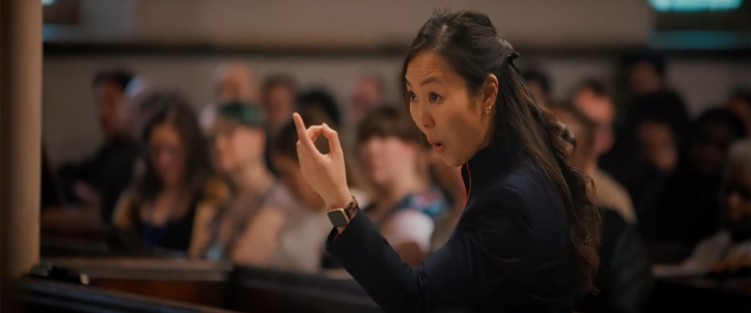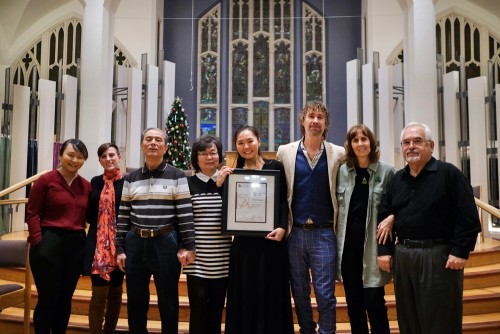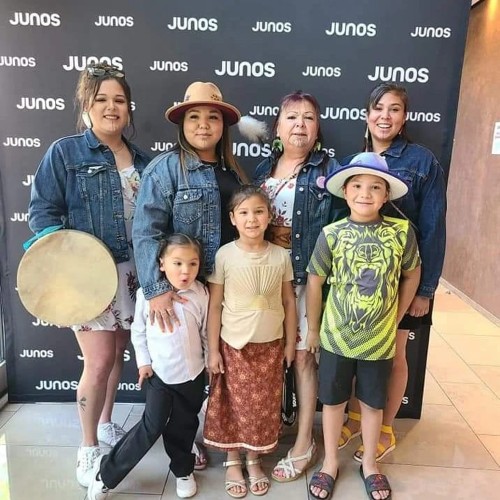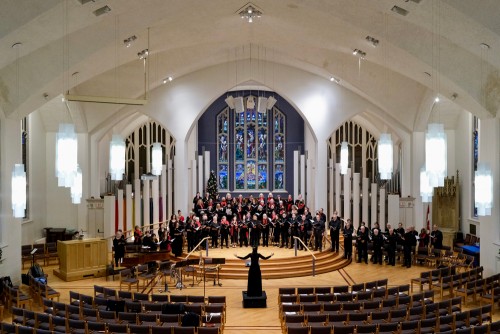 One day in the golden late ’80s in Hong Kong, almost past the reaches of Elaine Choi's memory, she balanced on her mother's piano bench. She was about three years old. Her mother helped one of her small fingers find middle C. The note resonated through the black upright Yamaha, as it did for the many piano students who filled Choi’s childhood home. Choi's own lessons with her mother turned out to be the beginning of an impressive international music career bridging East and West. But not as a performance soloist. Instead, Choi found success in one of music's most collaborative genres – as a conductor for choral music.
One day in the golden late ’80s in Hong Kong, almost past the reaches of Elaine Choi's memory, she balanced on her mother's piano bench. She was about three years old. Her mother helped one of her small fingers find middle C. The note resonated through the black upright Yamaha, as it did for the many piano students who filled Choi’s childhood home. Choi's own lessons with her mother turned out to be the beginning of an impressive international music career bridging East and West. But not as a performance soloist. Instead, Choi found success in one of music's most collaborative genres – as a conductor for choral music.
“I've always known that I love to play collaboratively,” Choi says. “What I love about choral music is really the community sense.”
Her first fully formed childhood musical memory is singing in a group. As a kindergartener at about five years old, she sang Christmas carols in a mall in Hong Kong. Later, in high school, her favourite school event was the yearly carolling program at a local hotel. In her early years, Choi also enjoyed making music with others as a pianist. She played duets with her mother and many of her mother’s students, then later with her younger sister. She wanted to join the school choir but was recruited instead to accompany them. In order to join other music groups, she kept learning new instruments. Violin to play in a string orchestra. Erhu to play in a Chinese orchestra. Then, after her mother and father brought their family to Canada in the early 2000s, Choi learned clarinet, just so she could play in the school band at St. Aloysius Gonzaga in Mississauga.
U of T: Choi entered the University of Toronto's music program in 2004, already intending to teach music. Despite her technical proficiency from a young age, she never wanted to be a solo artist. To her, making music always meant finding joy and friendship. She wanted to become a music educator to share these things with others. Three years into her degree, she took up yet another instrument to play in yet another ensemble: bassoon for the U. of T. Wind Symphony. But that year she also took a class in choral conducting, and that was a turning point. “When I found choral conducting, which really cannot survive without collaborative music making, I realized I found the vocation that I care so much and so deeply about,” Choi says.
Prior to attending university, the picture that came to mind for Choi when she pictured the word "conductor" was an old, authoritative, white man – in effect someone who felt like a solo artist. At U. of T. it was female choral conductors from the previous generation who became key role models for Choi. Her first choral conducting class was group-taught by sessional instructors including Lydia Adams, Zimfira Poloz and Doreen Rao, who became mentors, showing Choi how to stand at the podium for the purpose of bringing people together; showing her how conducting for singers was a way to create both beautiful music and community.
Adams modelled respect for everyone in a choir, listening closely to all singers’ feedback. Poloz modelled a commitment to life-long learning, always showing up to choral events with a notebook. And Rao modelled creative courage, believing in people's ability to do hard things.
Post-grad: In the years that followed university, Choi put these principles into practice. She began conducting many choirs throughout Toronto, including one she conducts to this day, as the Director of Music at Timothy Eaton Memorial Church. Her passion became showing people how choral music is an accessible art form most people can take up as a hobby even if they haven't had a lot of training: building lifelong skills in connecting with others, and something you can always come back to, at any age. “I breathe and think about and dream about choral music really because of the community and the joy of socializing,” Choi says.
Then, in 2014, Choi took on a Doctor of Musical Arts in Choral Conducting at U. of T., in the process gaining a new mentor, Hilary Apfelstadt, who also had a collaborative mindset.
Apfelstadt brought doctoral conducting students together in a studio setting. She taught Choi and the cohort that they cannot live in the world alone, and they cannot thrive in a music career as individualists. Indeed, as conductors, they would always be collaborating with a group. Apfelstadt demonstrated that everyone needs a support system around them and you shouldn't be afraid to lean on your colleagues and your friends. Some of Choi’s closest friends now are fellow choral conductors she met in Apfelstadt’s studio.
Lifetime benefit: The benefits of any life with rich relationships are well documented. So too are the specific benefits of a life spent singing with others. Choi likes to cite a survey by Choral Canada from 2017. The survey found that more people sing together in Canada than play hockey. Alongside the survey, Choral Canada reviewed scientific evidence for the ways singing together contributes to our lives, grouping the evidence into categories.
Singing has physical benefits: it improves heart health, boosts the immune system and relieves pain. Singing has educational benefits: it develops language, sharpens focus and obviously teaches musicianship. Singing even has psychological benefits: it improves memory, helps brain function and lowers stress.
Choral Canada's scientific review included one more category, which is Choi's favourite. Singing together also has social and emotional benefits: it builds identity, fosters connectedness and increases cooperation. “Group music-making has always been something that helped me find my identity,” Choi says.
In 2018, as she was completing her DMA, Choi founded a new musical group with her international identity in mind. Toronto-based Babεl is an innovative choir that focuses on Eastern repertoire. Its mission is to create cultural understanding through choral music. Through Babεl and other freelance jobs, Choi began working to familiarize Canadian singers and audiences with songs from Asia, expanding their language skills and appreciation beyond Latin or German to Arabic or Mandarin, along the way gaining a reputation as a groundbreaking choral conductor.
Pax: In 2021, Choi learned that Pax Christi Chorale was seeking a new conductor. She had known about Pax for many years, ever since she was mentored in the 2000s by its longest-serving conductor, Stephanie Martin. Choi felt she had to apply. After a rigorous process that showed her just how serious the Board was, Choi was appointed interim conductor. But it was the middle of the pandemic, and Pax was not performing live. Morale in the choir, as it was for so many at that time, was low. Choi rallied the choristers, practising with masks and social distancing.
On April 9, 2022, Choi stood on the podium before Pax at the George Weston Recital Hall in the Meridian Arts Centre. She took a breath to calm her nerves. The opening arpeggios of the Toronto premiere of Considering Matthew Shepard floated through the room. It was Pax's first live performance in over two years (just months earlier, a wave of the pandemic had forced them to cancel a concert of Christmas choral gems). The piece was not an easy one for a community choir with multiple generations to tackle: an hour-and-a-half long social justice oratorio composed by Craig Hella Johnson about a young gay man murdered because of his sexuality. But when the final opening arpeggio in the piece faded, Choi lifted her arms and voices filled the air together.
 At that concert, Pax announced Choi's appointment as their Artistic Director. The next year, Choi received the Leslie Bell Prize for Choral Conducting. The biennial prize recognizes excellence in an emerging Ontario conductor with an award of $10,000. Choi joined mentors Poloz (06) and Martin (98) as recipients of this prestigious award.
At that concert, Pax announced Choi's appointment as their Artistic Director. The next year, Choi received the Leslie Bell Prize for Choral Conducting. The biennial prize recognizes excellence in an emerging Ontario conductor with an award of $10,000. Choi joined mentors Poloz (06) and Martin (98) as recipients of this prestigious award.
Next: Choi is excited for the next phase of her career and all the various ways she's able to foster people's love of singing together. She’s grateful that she gets to work with children or adults who have never sung before, as well as the large groups of high-calibre amateurs and professionals who make up choirs like Pax. In the upcoming season, she will be a guest conductor in Beijing and Poland, in addition to her many on-going commitments in Toronto.
Pax takes the stage next on October 5, 2024 at the P.C. Ho Theatre in the Chinese Cultural Centre of Greater Toronto. They will be joined by Cathedral Bluffs Symphony Orchestra and Voices Chamber Choir for a community celebration marking the 200th anniversary of Beethoven's Ninth Symphony, Ode to Joy – a fitting example of fostered connection within the music community.
About the Leslie Bell Prize
The $10,000 Leslie Bell Prize celebrates and supports emerging professional choral conductors in Ontario. It was established in 1973 by friends of the late choir conductor Leslie Bell and the Leslie Bell Singers, who were at one point arguably the most popular choir in Canada with programs on the CBC. Their repertoire was usually unaccompanied. It ranged from Renaissance polyphony to pop music, often arranged by Bell.
The Prize is awarded every two years and is administered by the Ontario Arts Council. The jury that chose Elaine Choi as the 2023 laureate noted that her "commitment to intercultural repertoire and commissioning of new composers is groundbreaking."
The Prize was interrupted by the pandemic. The three winners preceding Elaine Choi were Charlene Pauls (18), Mark Vuorinen (16), and Rachel Rensink-Hoff (14). Pauls is currently Artistic Director of the Guelph Chamber Choir, Associate Artistic Director of the Oakville Choir for Children and Youth, and Music Director of Anglican Church of the Incarnation in Oakville. Vuorinen is currently Associate Professor and Chair of Music at Conrad Grebel University College at University of Waterloo, as well as Artistic Director of The Elora Singers. Rensink-Hoff is currently Associate Professor and Department Chair of Music at the Brock University Marilyn I. Walker School of Fine & Performing Arts, as well as Artistic Director of the Avanti Chamber Singers.
CHORAL ROUNDUP
Singing together as a community art
Not chronologically the first concert of choral interest this issue, Singing for Truth and Reconciliation, October 1, is nonetheless a good place to start this roundup of early seasonal choral activity, not because the Manitou Mkwa Family Singers are the headliner, but because their presence grounds the event in the most fundamental of all collective musical acts – singing together.
 Powerful Indigenous voices will gather at Koerner Hall on October 1, to honour our National Day of Truth and Reconciliation, none more powerful than internationally celebrated, Nunavut-born Inuk throat singer, songwriter, novelist, actor, and visual artist Tanya Tagaq. Hosted by self-described “pissed-off Mohawk playwright” and CBC host Falen Johnson, this avant-garde and classical concert also brings to the stage two-spirit activist, advocate, artist and opera performer Emma Pennell who is Mi’kmaq from Ktaqmkuk (Newfoundland), along with Manitou Mkwa Family Singers, from the Mississaugas of the Credit First Nation. David Eliakis on piano and Jennifer Tung conducting the Royal Conservatory Orchestra round out the evening’s participants. Oct 01, 8pm: Commemorate the National Day of Truth and Reconciliation. Royal Conservatory of Music, Koerner Hall.
Powerful Indigenous voices will gather at Koerner Hall on October 1, to honour our National Day of Truth and Reconciliation, none more powerful than internationally celebrated, Nunavut-born Inuk throat singer, songwriter, novelist, actor, and visual artist Tanya Tagaq. Hosted by self-described “pissed-off Mohawk playwright” and CBC host Falen Johnson, this avant-garde and classical concert also brings to the stage two-spirit activist, advocate, artist and opera performer Emma Pennell who is Mi’kmaq from Ktaqmkuk (Newfoundland), along with Manitou Mkwa Family Singers, from the Mississaugas of the Credit First Nation. David Eliakis on piano and Jennifer Tung conducting the Royal Conservatory Orchestra round out the evening’s participants. Oct 01, 8pm: Commemorate the National Day of Truth and Reconciliation. Royal Conservatory of Music, Koerner Hall.
Memory Fundraiser
In its present form, Recollectiv offers a free music session for people with memory challenges at 2pm each Saturday afternoon, via Zoom. But it didn’t start out that way.
As the story goes, in the summer of 2017, the initiative’s founder, singer Ilana Waldston, heard a radio show about The 5th Dementia, a California-based band for musicians with cognitive deficits and their companions, and decided to spearhead a similar ensemble in Toronto. Recollectiv – which combines “recollect” and “collective” – debuted in March 2018, but not on Zoom, rather live, at the barrier-free Tranzac Club in Toronto’s Annex neighbourhood, “giving Recollectiv’s musicians with brain injuries and their care partners a regular hour-long sanctuary from stress” as writer Vivian Fellegi described it in a November 2018 WholeNote story easily accessible on the Recollectiv website.
As was the case with just about all collective live musical activity the pandemic put paid to those monthly Saturday Tranzac afternoons, but from the ashes of that initiative, the weekly Saturday ZOOM gatherings were born, free to all participants, thanks to the generosity of volunteers and donors, and capable of reaching a much wider audience.
Saturday, Sep 15, 1:30-3:30pm, Recollectiv goes back to its roots with A Little Help from Our Friends: a Recollectiv Benefit at the Tranzac Club, 292 Brunswick Ave, hosted by Sharon Hampson (formerly of Sharon, Lois & Bram) and featuring singer Heather Bambrick with Peter Hill on piano and Jordan O’Connor on bass. Come out in person to help raise money for this active group.
Choir!Choir!Choir! Epic Anthems
If somehow you haven’t yet heard about the Choir!Choir!Choir! phenomenon, head over to Youtube to check it out. And then join Choir!Choir!Choir! for Hallelujah: An Epic Anthem Sing-Along at one of their three stops in Ontario this September: Sep 21, 2pm and 8pm at the National Arts Centre in Ottawa; Sep 26, 8pm at the Burlington Performing Arts Centre; and, Sep 27, 8pm at Centre in the Square in Kitchener.
Singing with Shapes: An ethnomusicologist friend recommended I try this unique opportunity to sing in the city. At the Toronto Shape Note Singers, you don’t have to be able to read music in the conventional way, instead relying on a simple legend of shapes. Everyone is welcome. Music is from the Sacred Harp tunebook and the focus is on participation—not performance. I hope to make it out this fall.
Sep 18 7:30: Friends House, 60 Lowther Ave. 647-838-8764. Pay-What-You-Can (PWYC). Also Oct 16, Nov 20 & Dec 18.
Angus MacCaull is a Toronto-based journalist and poet published in Maclean's, CV2 and forthcoming for The Walrus. He is currently at work on a memoir about coming to terms with tinnitus as a promising young clarinetist.




